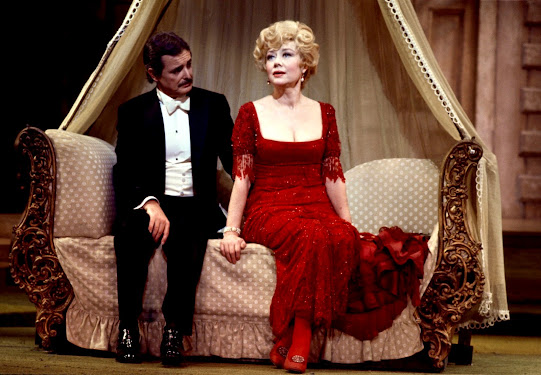Farewell to Glynis Johns, aged 100: beautiful lady (with amazing eyes) and exceptionally talented actress, equally skilled at playing dramatic, romantic or comedic roles. Daughter of veteran Welsh actor Mervyn Johns (himself a considerable talent), Glynis was at home on stage or in front of the camera, but it was the movies that elevated her career to star status.
Glynis made her film debut in 1938 in South Riding and success was quickly followed with Powell and Pressburger's 1941 war drama 49th Parallel in which stepping into a role vacated by Elisabeth Bergner in a very starry cast (Leslie Howard, Laurence Olivier, Anton Walbrook and Raymond Massey) and for which she won a National Board of Review Award for Best Acting. In 1948 she had a triumph as the titular mermaid in the screwball comedy, Miranda which also featured David Tomlinson with whom she would later co-star in Mary Poppins as Mrs and Mr Banks.
Other films that followed included The Card second-billed to Alec Guinness and Flesh and Blood co-staring alongside Richard Todd; Walt Disney would subsequently cast Johns and Todd in two historical pictures: The Sword and the Rose and Rob Roy, the Highland Rogue. She provided a glamorous foil to Danny Kaye in his glorious medieval musical-romp, The Court Jester; and co-starred with Deborah Kerr, Robert Mitchum and Peter Ustinov in The Sundowners, with Dan O'Herlihy in The Cabinet of Caligari and with Peter O'Toole, Burton and Taylor in Under Milk Wood.
On stage, Glynis was the first actress play the role of Desiree Armfeldt in Stephen Sondheim's 1973 Broadway hit, A Little Night Music, in which she introduced – in her hallmark, husky voice – what would become one of Sondheim's most best-loved and enduring songs, 'Send in the Clowns'.
This performance won Glynis a Tony Award for Best Actress in a Musical and Drama Desk Award for Outstanding Actress in a Musical. Sondheim likened her voice to a "rumpled bed", which is less of an insult than an acknowledgement of her seductive delivery.
Writing in The New York Times, music critic Anthony Tommasini perceptively said of the song: "Stephen Sondheim composed his most famous song, 'Send In the Clowns,' for an actress with virtually no voice ... and few genuine singers have performed it as effectively." Which is unquestionably true.
Of course, Glynis had already sung a roistering number in Walt Disney's 1964 film triumph, Mary Poppins, delivering 'Sister Suffragette', a militant battle-cry for women's rights in Edwardian England in the role of Jane and Michael's mother Mrs Winifred Banks. As the story goes, Walt invited Glynis to the studio, planning to offer her the role of the mother of the two children, Jane and Michael; however, the actress (already a Disney leading lady) assumed she was going to be offered the film's title role.
To sell the supporting role and mollify the disappointed star, Walt called Poppins composers, Richard and Robert Sherman, and told them that he was taking Glynis to lunch and, afterwards, would be bringing her to the music room so they could play the new song they had composed for her. The Sherman Brothers, decoding Walt's unexpected call, worked through their own lunchtime and rewrote an abandoned song for Mary Poppins – 'Practically Perfect in every way / In ev'rything I do and in everything I say...' as a suffrage mission statement that now began, 'We're clearly soldiers in petticoats / Dauntless crusaders for women's votes!' The ruse (and the song) worked the necessary magic and Miss Johns accepted the role.





No comments:
Post a Comment